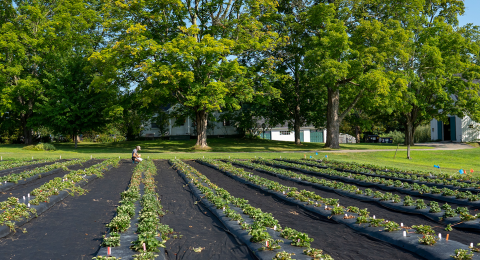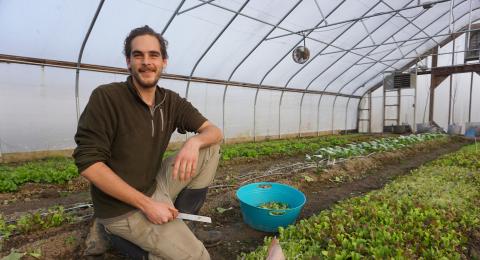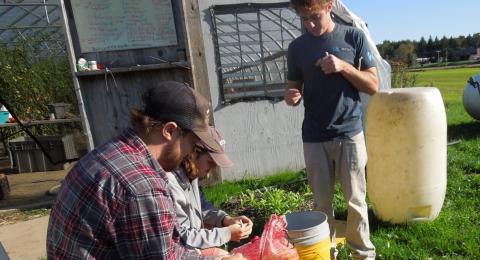The Agriculture and Food Systems major at UNH combines theoretical knowledge with practical applications, preparing you for a range of careers in the agriculture industry including agricultural entrepreneurship, environmental consulting and food safety. You’ll build a strong foundation for a sustainable future through a dynamic, experience-based curriculum designed to equip you for success.
What is agriculture and food systems?
Agriculture and food systems is a broad field integrating the natural sciences, social sciences, and business skills, plus much more. Agriculture and food systems are key to solving many of the major challenges facing the world, such as producing food to meet the needs of an ever-growing populations while conserving land, water, and other natural resources. An understanding of these challenges and potential solutions can enhance any career.
Why study agriculture and food systems at UNH?
Our B.A. degree program is ideal for students interested in developing a broad base of knowledge and experience in modern agricultural and food systems with the flexibility to take courses from a variety of disciplines or to pursue a dual degree, second major or minor. Each student develops their own customized emphasis area within agriculture and food systems: agroecology, horticulture, animal agriculture, agriculture and food systems policy, and entrepreneurship are some examples. Most of our students also gain hands-on experience in cutting-edge research taking place at our top-notch agricultural research facilities including two working dairy farms, horticulture and agronomy farms, greenhouses, and the UNH brewing science laboratory.
Potential careers
- Agricultural business management/entrepreneurship
- Agricultural research
- Agricultural services and support
- Education and outreach
- Grant writing
- Policymaking
- Production of food and fiber
Curriculum & Requirements
The Agriculture and Food Systems B.A. offers a highly flexible curriculum to students interested in cultivating expertise in a wide variety of topics including modern agricultural practices, the science and management of working landscapes, local and regional food systems, value-added agricultural products, and the promotion of healthy eating through sustainable food production and policies. An interdisciplinary field comprising the social, physical, and life sciences and beyond, agriculture and food systems lie at the center of many of the major challenges facing the world, such as producing food to meet the needs of an ever-growing population while conserving natural resources and promoting human wellness.
Our students get hands-on experience in applied coursework and are actively encouraged to conduct impactful research alongside faculty. Our graduates become practitioners and entrepreneurs of agricultural and food businesses, researchers and policy-makers at state/federal agencies and non-profit organizations, laboratory technicians, and agricultural educators. Some go on to obtain advanced degrees in the agricultural sciences.
Degree Requirements
All Major, Option and Elective Requirements as indicated.
*Major GPA requirements as indicated.
Major Requirements
The AGFS B.A. program structure includes FOUR major components: foundation courses, courses in a student-designed emphasis area, program elective courses, and a capstone. You must earn a minimum grade of C- in all courses required for the major.
Foundation courses include 37 credits, which satisfy at least 5 of the University Discovery requirements.
Student-Designed Emphasis courses include 20 credits that make up a cohesive emphasis or focus area. Courses may be selected from the List of Approved Program Electives, but do not need to be on that list. Each student will define their emphasis area in consultation with their advisor and submit it to the AGFS program committee for approval prior to the start of their 7th semester.
Elective courses include 16 credits, chosen from the List of Approved Program Elective courses.
| Code | Title | Credits |
|---|---|---|
| Foundation Courses (B.A.) | ||
| AGFS 421 | Introductory Horticulture | 4 |
| AGFS 405 | Sustainable Agriculture and Food Production | 4 |
| AGFS 502 | Agroecology | 4 |
| AGFS 602 | Emphasis Development and Professional Pathways in Sustainable Agriculture and Food Systems | 1 |
| AGFS 620 | Food Systems & Community Resilience | 4 |
| AGFS 690 | Agricultural and Food Policy | 4 |
| or NR 411 | Environmental and Resource Economics Perspectives | |
| or ECON 402 | Principles of Economics (Micro) | |
| ANSC 421 | Introduction to Animal Science | 4 |
| BIOL 528 | Applied Biostatistics I | 4 |
| or NR 525 | Statistical Methods and Applications | |
| CHEM 411 | Introductory Chemistry for Life Sciences 1 | 4 |
| or CHEM 403 | General Chemistry I | |
| NR 501 | Studio Soils | 4 |
| Student-Designed Emphasis Area | ||
| At least 20 credits, proposed using the emphasis area declaration form (see your advisor) at least 1 year prior to planned graduation date. | 20 | |
| Electives | ||
| Select 16 credits from the approved electives list below. | 16 | |
| Capstone | ||
| AGFS 733W | Advanced Topics in Agriculture and Food Systems | 4 |
| or ANSC 750 | Collaborative Farm Design and Development | |
- 1
Some courses (e.g. genetics, microbiology) require CHEM 403 and CHEM 404 as a prerequisite. If you intend to take these courses, you should take CHEM 403 rather than CHEM 411.
| Code | Title | Credits |
|---|---|---|
| Approved Electives | ||
| AAS 421 | Large Animal Behavior and Handling Techniques | 2 |
| AAS 423 | Dairy Selection | 2 |
| AAS 425 | Introduction to Dairy Herd Management | 4 |
| AAS 432 | Introduction to Forage and Grassland Management | 3 |
| AAS 434 | Equipment and Facilities Management | 3 |
| AAS 439 | Fundamentals of Animal Health | 2 |
| AGFS 410 | A Taste of the Tropics | 4 |
| AGFS 415 | Introduction to Brewing Art and Science | 4 |
| AGFS 515 | Technical Brewing | 4 |
| AGFS 601 | Fruit Crop Production | 4 |
| AGFS 632 | Urban Agriculture | 4 |
| AGFS 651 | Plant Pathology | 4 |
| AGFS 670 | Systems Thinking: Land Use Capability and Sustainability in Aotearoa New Zealand | 4 |
| AGFS 671 | Agroecology and Sustainable Land Management in Aotearoa New Zealand | 4 |
| AGFS 672 | Pathways to Sustainable Agriculture and Food Systems in Aotearoa New Zealand | 4 |
| AGFS 673 | Agricultural Production and Business Practice in Aotearoa New Zealand | 4 |
| AGFS 679 | Food Production Field Experience I | 4 |
| AGFS 680 | Food Production Field Experience II | 4 |
| AGFS 689W | Greenhouse Management and Operation | 4 |
| AGFS 690 | Agricultural and Food Policy | 4 |
| AGFS 733W | Advanced Topics in Agriculture and Food Systems | 4 |
| AGFS 750 | Food System Solutions; Increasing Sustainability and Equity | 4 |
| AGFS 760W | Integrated Pest Management | 4 |
| AGFS 795 | Investigations | 1 |
| AGFS 799H | Honors Senior Thesis | 1 |
| ANSC 548 | Agricultural Business Management | 4 |
| ANSC 600 | Field Experience | 1-4 |
| ANSC 602 | Animal Rights and Societal Issues | 4 |
| ANSC 603 | Introduction to Livestock Management | 4 |
| ANSC 605 | Poultry Production and Health Management | 4 |
| ANSC 609 | Principles of Animal Nutrition | 4 |
| ANSC 612 | Genetics of Animals | 4 |
| ANSC 625 | Animal Diseases | 4 |
| ANSC 650 | Dairy Industry Travel Course | 1 |
| ANSC 690 | Livestock and Wildlife in Namibia: Challenges, Opportunities and Geography | 4 |
| ANSC 698 | Cooperative for Real Education in Agricultural Management (CREAM) | 4 |
| ANSC 701 | Physiology of Reproduction | 4 |
| ANSC 710 | Dairy Nutrition | 4 |
| ANSC 715 | Physiology of Lactation | 4 |
| ANSC 724 | Reproductive Management and Artificial Insemination | 4 |
| ANSC 727 | Advanced Dairy Management I | 4 |
| ANSC 728 | Advanced Dairy Management II | 4 |
| ANSC 750 | Collaborative Farm Design and Development | 4 |
| ANSC 795 | Investigations | 1-4 |
| BIOL 409 | Green Life: Introducing the Botanical Sciences | 4 |
| BIOL 510 | Mushrooms, Molds, and Mildews: Introduction to the Fungal Kingdom | 4 |
| BIOL 541W | Ecology | 4 |
| BIOL 566 | Systematic Botany | 4 |
| BIOL 704 | Plant-Microbe Interactions | 3 |
| BIOL 720 | Plant-Animal Interactions | 4 |
| BIOL 752 | New England Mushrooms: a Field and Lab Exploration | 4 |
| BMS 503 | General Microbiology | 3 |
| BMS 504 | General Microbiology Laboratory | 2 |
| CEP 415 | Community Development Perspectives | 4 |
| CHBE 410 | Energy and Environment | 4 |
| ECOG 401 | Introduction to Ecogastronomy | 4 |
| GEN 604 | Principles of Genetics | 4 |
| GEN 772 | Evolutionary Genetics of Plants | 4 |
| GEOG 670 | Climate and Society | 4 |
| HMGT 570 | International Food and Culture | 4 |
| MGT 520 | Topics in Management | 4 |
| MKTG 530 | Survey of Marketing | 4 |
| NR 425 | Field Dendrology | 4 |
| NR 435 | Contemporary Conservation Issues and Environmental Awareness | 4 |
| NR 504 | Freshwater Resources | 4 |
| NR 506 | Forest Entomology | 4 |
| NR 527 | Forest Ecology | 4 |
| NR 579 | Wildland Fire Ecology and Management | 4 |
| NR 602 | Natural Resources and Environmental Policy | 4 |
| NR 643 | Economics of Forestry | 4 |
| NR 650 | Principles of Conservation Biology | 4 |
| NR 706 | Soil Ecology | 4 |
| NR 729 | Silviculture | 4 |
| NR 749 | Forest Inventory and Modeling | 4 |
| NR 760 | Geographic Information Systems in Natural Resources | 4 |
| NR 761 | Environmental Soil Chemistry | 4 |
| NR 782 | Forest Health in a Changing World | 4 |
| NR 785 | Systems Thinking for Sustainable Solutions | 4 |
| NUTR 400 | Nutrition in Health and Well Being | 4 |
| NUTR 405 | Food and Society | 4 |
| NUTR 550 | Food Science: Principle and Practice | 4 |
| NUTR 720 | Community Nutrition | 4 |
| NUTR 730 | From Seed to Sea: Examining Sustainable Food Systems | 4 |
| NUTR 795 | Investigations | 1-4 |
| RMP 724 | Research, Evaluation, and Data-Driven Decisions | 4 |
| MEFB 772 | Fisheries Biology: Conservation and Management | 4 |
| ZOOL 555 | Introduction to Entomology | 4 |
| ZOOL 610 | Principles of Aquaculture | 4 |
University Requirements
In addition to meeting the AGFS major requirements, students must satisfy all University requirements including those that pertain to the minimum number of credits, grade-point average, writing-intensive courses, the Discovery Program, and foreign language for B.A. students only.
Program Learning Outcomes
- Students will demonstrate a working understanding of the interdisciplinary nature of agriculture and food systems and the basic principles underpinning sustainability including: economic viability, environmental stewardship, social responsibility, and the trade-offs between competing metrics of sustainability.
- Students will demonstrate in-depth knowledge, critical thinking and analysis, and effective written communication in a self-declared area of emphasis within the program.
- Students will gain an applied understanding of agriculture and food systems by engaging in an experiential education opportunity.
- Students will be able to independently interpret, evaluate, and engage with research in the agricultural sciences, including its biological, physical, social, and/or economic aspects.
Explore Program Details
Why study Agriculture and Food Systems (AGFS)?
Encompassing everything from land use, natural resource management, food production, processing, distribution, policy, consumption, and human health, the food system is one of the most complex and vital underpinnings of society. The AGFS major is designed to provide students with a foundational understanding of this complexity so that they may effectively engage in the ongoing evolution of our food system to meet future economic, social, and environmental challenges.
What kinds of jobs do AGFS graduates get?
Since the program began in 2010, our AGFS graduates have gone on to pursue a wide variety of exciting and fulfilling careers. Most (80%) are working in production agriculture or another sector of the food system. Some have chosen to pursue post-graduate degrees in agricultural science, nutrition, law, and related fields. Many are entrepreneurs or managers of food and agricultural businesses, and many others are educators, communicators, or advocates who support agricultural enterprises or consumers.
What are the opportunities in AGFS for "hands-on" learning and courses that would give me practical experience working in agriculture?
There are many!
For students interested in animal agriculture, there are numerous experiential courses, where students manage and care for animals as part of course requirements. All the following courses also include lectures and traditional assignments, but students take what they learn and apply it daily to the animals kept at UNH. These courses include Introduction to Livestock Management with a flock of sheep on campus in the spring semester, PEEP (Poultry Experiential Education Program) where students raise broilers over the course of the fall semester, and CREAM (Cooperative Real Education in Agriculture Management), where students manage (including feeding and milking) a herd of dairy cows for the entire school year.
For students interested in horticulture or plant-based agriculture, students in our Food Production Field Experience courses apply their knowledge of crop scheduling and planning to Farm to YouNH. Each student works in open-field and protected agriculture environments to produce crops year-round for UNH dining and catering.
Is it possible to add a double major, dual major or minor and still graduate on time?
Yes! The AGFS major is relatively flexible, and it is usually possible to add a dual major or minor as well as the AGFS major within four years. It is also possible, but a bit more challenging, to add a double major. This is more difficult for students transferring from other institutions or other majors if they have taken many classes that do not meet major requirements.
How big is the program?
The AGFS program currently has about 60 majors, so approximately 15 students graduate each year. We feel this is large enough to offer a cohesive group and critical mass, while also being small enough to offer personalized attention and small classes. There are currently faculty members representing a wide range of disciplines who teach and advise SAFS students. And our students benefit from a having a broad selection of courses as they pursue their specific interests within the program.
Are there opportunities to work closely with faculty?
Yes! Most of our majors do research in the labs of one or more faculty members while they are here at UNH. UNH hosts one of the largest undergraduate research conferences in the nation, and it is a great opportunity to share research results with other students, faculty members, and the broader community.
Are there opportunities to get hands-on experience working on farms, or internships with agricultural businesses or other sectors of the food system?
Yes! Many of our faculty have relationships with the agricultural community and the broader food system, and we post and share job opportunities on a regular basis.
There are also many jobs available on the UNH career database, Handshake. The College of Life Sciences and Agriculture is also home to the St. Martin Career Exploration Office, a terrific resource offering professional development for students.
Some of our AGFS majors have also taken advantage of Semester in the City, a UNH program that involves a semester in Boston with internships in urban agriculture and organizations working to enhance food security. Finally, UNH maintains numerous farms on or just off campus where students are strongly encouraged to apply for work-study positions, where they can work with animals, crops, and assisting faculty on research projects in the field.
It is easy. Once a student is accepted to UNH, an official credit evaluation will be completed to determine the total credits transferred and any Discovery Requirements that have been fulfilled. Then, we determine which courses from other institutions will be accepted towards fulfilling major requirements. We are happy to talk about what this might look like before you apply – please contact the program coordinator if you’d like more information.
Yes! Instead of having specific pre-determined “tracks” or “options”, each student defines and names their own emphasis area that comprises a cohesive group of courses. Recent emphasis areas declared by our students include dairy management, crop production and management, horticulture business operations, agricultural policy, agroecology, community nutrition and food systems, educational methods in agriculture, and many more.
Typically, near the end of their junior year, each student develops a proposal, writing an essay that explains how the courses chosen represent a cohesive emphasis area, and how this relates to the student’s personal and professional goals beyond UNH. A committee of faculty reviews and approves each emphasis area.
Yes! We do offer a minor in AGFS, consisting of five courses. We also offer two other related minors: Environmental Horticulture and Brewing Science.
What is a Student-Designed Emphasis?
Agriculture and food systems (AGFS) is a highly diverse subject area encompassing numerous
topics and disciplines. In addition to providing you a broad introduction to AGFS through a required set
of Foundation Courses, the AGFS program is designed to encourage you to continue to explore your
interests and further broaden your exposure through the free pursuit of a set of approved Program
Electives (20 CR). By your junior year, with your Foundation Courses and at least some Program
Electives completed, you will be ready to develop and propose a personal Student-Designed Emphasis
(20 CR), comprised of another set of freely-chosen courses. Unlike your broad Program Electives,
however, which are opportunities to explore different areas of potential interest (i.e. increase your
breadth), the courses that comprise your Emphasis must form a coherent set of classes that build depth
in an area of particular interest to you.
What do I need to do?
In your first two years, you should concentrate on completing your Foundation Courses and taking
approved Program Electives that interest you, with an eye toward expanding your understanding of the
many aspects of agriculture and the broader food system. To help you choose among the many
electives, consider this list of Possible Pathways/Courses. Then in your fifth semester (usually the Fall
semester of your junior year), you will develop and formally declare your emphasis by completing the
Student-Designed Emphasis Area Declaration Form. You must submit your completed Declaration Form
to your academic advisor before the start of your sixth semester (usually the Spring semester of your
junior year).
How do I complete the form?
Successful completion of the Declaration Form begins with reflection on your part about what area
within SAFS you would like pursue in greater depth. You will need to give a name to your Emphasis Area
and then assemble a set of electives (20 CR) that work together to develop depth and focus in that area.
As part of the form, you will also submit a thoughtful, personal, substantive, and well-written essay (1-2
pages) that:
- Starts with a clear introductory paragraph that names and describes your emphasis area,
explains your interest in it, and lists your selected courses (20 CR); - Describes how each of the selected courses, one by one, builds depth and focus in your
chosen emphasis area and how they function together in coherent support of it; - Explains how your emphasis relates to your future goals, personally and professionally; and
Ends with a thoughtful concluding statement.
Please note that at the time of submission, you will have at least three semesters left in the program,
which means that you are creating a proposed plan for taking well-chosen emphasis classes in your
remaining semesters. In other words, many if not all of your emphasis classes may still be outstanding,
making your Emphasis Declaration a prime opportunity to receive feedback from multiple AGFS faculty
members on your academic plans. Because your essay will be evaluated critically by all AGFS Program
Committee faculty members, it should be considered a serious piece of writing, with the thought and
effort that entails.
Students interested in the Agriculture and Food Systems major may also be interested in the following advanced degrees at UNH. Students in the program also have the opportunity to participate in the UNH accelerated master’s program.
Natural Resources and the Environment M.S.
Natural Resources: Ecosystem Science M.S.
Natural Resources: Environmental Conservation and Sustainability M.S.



















